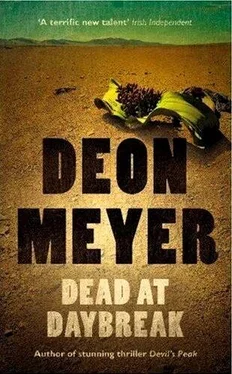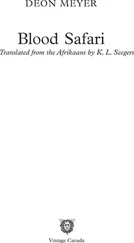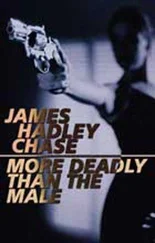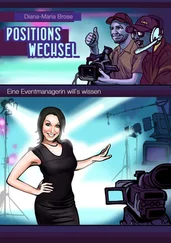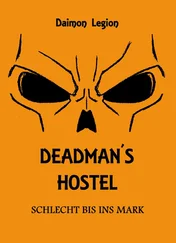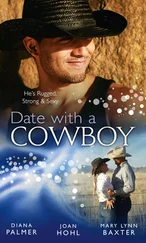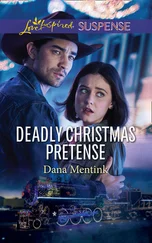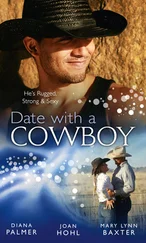“I can always arrest you.”
“What for?”
“You’re way over the beauty limit.”
“Rhodes House,” said Van Heerden.
“612,” said Tiny.
“A sweet talker,” said Maria, and tapped on the keyboard of her computer. “612 isn’t to let.”
“We want to know who rents it now.”
“It’s not let, it’s owned.”
“Who owns it?”
Typed again, looked at the screen. “Orion Solutions.”
“Do you have an address?”
“I do, I do, I do,” she said, and looked at Tiny.
“Can we get it today?” asked Van Heerden.
“He’s real good with the ladies,” said Tiny.
“I’ve noticed. It’s Solan Street in Gardens. 78 Solan. Do you want the telephone number as well?”
“I do, I do, I do.”
♦
Miller ran down the side street. Hope Beneke saw him through the gusts of rain. “Miller!” she screamed, hysteria in her voice, as he ran on.
“I’m going to publish the picture, Miller.” Despairing, angry, upset, O’Grady’s staring eyes filled her head. She saw Miller halting, looking round, waiting for her. Her hair was soaked, she kept her hand on the weapon in her handbag, and when she reached him she took out the SW99.
“You’re not going anywhere, do you hear me?”
“They’re going to kill us.”
“Who the fuck are they?” she said, distraught.
“Orion,” he said. “Orion Solutions.”
“And who are you?”
“Jamie Vergottini.”
♦
They drove to town, to Gardens, 78 Solan Street, in the Mercedes. Tiny’s cell phone rang. “Mpayipheli,” he answered. “It’s for you” – passing the phone to Van Heerden.
“Hallo.”
“I’ve got Vergottini,” said Hope.
“Where are you?”
“In the rain on Kloof Street, on the corner, at Café Paradiso, and I know who’s behind it all.”
“Venter?”
“Orion Solutions.”
“I know.”
“You know?”
“We tracked the clues.”
“O’Grady is dead, Van Heerden.”
“Nougat?”
“They shot him. In the restaurant. I – we…it’s a long story.”
“Who shot him?”
“They shot from outside. I didn’t see. Vergottini says the shot was meant for him. O’Grady got up to fetch food…”
“Jesus.”
“What do I do now?”
“Wait for us – we’re on De Waal Drive, we’ll be there in five minutes. Give me the street’s name.”
“O’Grady is dead,” he said to Tiny Mpayipheli when he’d finished talking, the cell phone shaking in his hand.
“The fat policeman?”
“Yes.”
“Now the shit is going to hit the fan.”
“He was a good man.”
Rain on the window, wind blowing from the harbor, the Mercedes swerving as they drove across the spur of the mountain on De Waal Drive.
“A good policeman,” said Van Heerden.
“I saw you in the flat, searching that body,” said Mpayipheli. “Your heart is soft.”
“It’s all getting too much.”
“Why did you become a policeman?”
He shook his head.
“You’re a good person, Van Heerden.”
He said nothing. He would have to phone Mat Joubert. But first, the dollars.
It was all getting too much.
∨ Dead at Daybreak ∧
54
Nonnie Nagel had phoned, just after five that afternoon. “He’s going to a meeting about the Red Ribbon affair. He told me he wouldn’t be home until after twelve. Fetch me. At eight o’clock. We’re going out.”
We never went out. We were either at the Nagel house or at mine, but we never went out because we were too frightened that someone would see us. Our love, our togetherness, was between four private, clandestine walls, but we hadn’t seen each other for more than three weeks and there was excitement in her voice, a playfulness, a recklessness. I wanted to refuse, we shouldn’t have chanced it, but the longing was too great, the possibility that she might announce, tonight, that she was ready to leave him.
“Where to?” I asked when she got into the car two blocks away from their home.
“I’ll explain.”
I wanted to ask her why – why this evening, why were we going out, and what about when we went back, what if he was at home by then? But I said nothing, just drove, with her hand on my thigh and that secret smile on her face.
It was a dance hall in Bellville, just off Durban Road, not a nightclub, a place for ballroom, packed, the music loud, the light subdued. There was festivity in the air, she looked beautiful in a simple white dress, sleeveless, and white sandals, and when we walked in she took my arm and we moved over the floor and she threw her head back and laughed, deeply, with joy and abandonment, and the bass of the loudspeakers throbbed through our bodies.
I have never been a good dancer. My mother taught me in the living room in Stilfontein but she was no expert. I could get along well enough not to make a fool of myself.
That evening, with her, the music moved me. We stayed on the floor for the first hour, one tune after another, pop from the seventies, sixties, eighties, Afrikaans rock. We kept dancing, dripping with perspiration. My shirt, her dress, clung to our bodies, her eyes glowed, her laughter, her joy shone, there for everybody to see.
And then she wanted a beer and we dodged through the crowd to a bar counter and swallowed our ice-cold beers and ordered two more, looked for seating and drank the second beer more slowly, our eyes on the other dancers. A thin little guy in black pants and a white shirt and a black waistcoat asked her to dance and she looked questioningly at me and I nodded. She rose and went to dance with him and I watched her with a lightness in me, light-headed with love and tenderness, watching her as she glided expertly over the floor with him, remembering at that moment Van Wyk Louw’s poem “The Hour of the Dark Thirst.” I heard Betta Wandrag’s voice again, reciting those sadly beautiful words: At eleven o’clock your body was/ A hunger and thirst in me…
And then she came to fetch me again and we danced and at ten o’clock she looked at her watch and said, “Come,” and pulled me to the car, to my house, and we threw off our clothes from the front door to the double bed in our feverish haste to reach skin and flesh and love, and Betta Wandrag was right, because love with the One was different, so divinely different.
At one o’clock your hair ,
caught my hand in an evil web ,
your body like black, still water ,
your breath a little sob .
Sometime after eleven we lay in each other’s arms, whispering as we always did, whispering to safeguard the secret of our togetherness, a laughing, pointless conversation, when he hammered at my door, a deep dhom, dhom, dhom of his fist on my door, and we lay there, petrified. I pulled on shorts. “Don’t open,” she’d said, whispering, urgent, despairing, begging. I walked out. “Please,” I heard her say as I walked down the dark passage. Dhom, dhom, dhom against my front door, I opened it, and Nagel stood there, fire in his eyes.
“Get dressed. We know who Red Ribbon is.”
Facing each other, on the threshold of my house, we knew he knew she was inside, and there was hatred between us, deep, black hatred until he turned away.
“I’ll wait in the car.”
∨ Dead at Daybreak ∧
55
Speckle Venter, he thought, the only one left. “And then they allowed us to sleep. We were very tired but then Speckle took out his guitar. His real name is Michael Venter. He’s very short, Pa, and he has a birthmark on his neck. So they call him Speckle. He comes from Humansdorp. His father is a panel beater. He wrote a song about his town. It’s quite sad …”
Читать дальше
